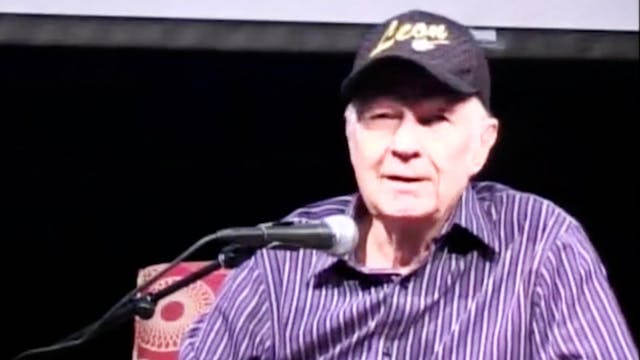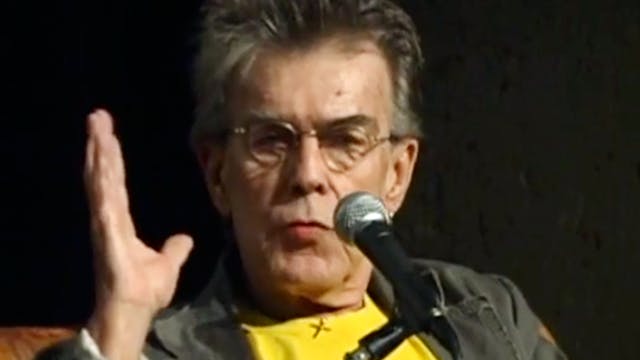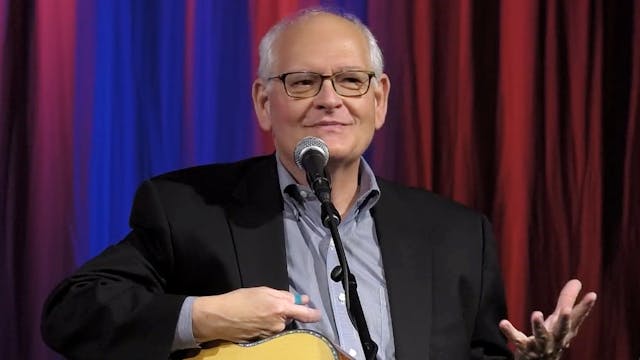Michael Rhodes • Nashville Cats, 2015
Just Added
•
1h 40m
Michael Rhodes—an accomplished bassist who has recorded with icons of country, pop, rock, and blues—speaks about his formative years, his move to Nashville, his approach to session work, and the gear he prefers in the studio during this interview at the Country Music Hall of Fame and Museum, held on March 7, 2015, as part of the Nashville Cats series.
Born on September 16, 1953, Rhodes started his musical career in his hometown of Monroe, Louisiana. He cites Jerry Lee Lewis and Elvis Presley as artists who influenced his musical tastes as a boy. Rhodes was eleven or twelve when he received his first guitar, and, he remembers, “I always plunked around on the bottom strings. That’s kind of just where I heard things.”
Rhodes talks about learning how to play bass by borrowing his neighbor’s instrument, and points to the numerous teen clubs for budding bands in Monroe as invaluable contributors to his learning process.
After developing his talent in Austin, Memphis, and Los Angeles, Michael Rhodes relocated to Nashville in 1977 and discovered that he liked session work. Soon, he launched a studio career, playing on demos at Tree Publishing Company (often with drummer Eddie Bayers). Rhodes says he applied what he innately knew about country music in order to record demos.
“You had to learn how to not play, and to make every note mean something,” he says. “To be as precise as the lyrics were. In a well-written country song, there’s not a wasted word. You learn to play to that. The song will tell us.”
In the 1980s, Michael Rhodes shifted from demos to studio sessions with artists such as JJ Cale, Rosanne Cash, Rodney Crowell, Dan Seals and Marie Osmond, Randy Travis, and Hank Williams Jr. He speaks highly of the top producers of that era, including Barry Beckett, Jimmy Bowen, Kyle Lehning, and Jim Ed Norman, and shares a memory of touring in South Africa with Dolly Parton.
Later, he speaks about recording with Steve Winwood and being a photographic subject for Japanese fashion designer Yohji Yamamoto. Rhodes also discusses recording with Buck Owens and Ringo Starr, Cat Stevens, and Larry Carlton.
In the 1990s, Rhodes participated in sessions for a Tammy Wynette duets album, appeared on Shawn Colvin’s pop hit “Sunny Came Home,” and played on major country hits including Trisha Yearwood’s “How Do I Live” and Lee Ann Womack’s “I Hope You Dance.” (Rhodes also played on LeAnn Rimes’s version of “How Do I Live,” which became a pop smash.)
He describes his time recording with the Beach Boys’ Brian Wilson during this same era as surreal and fascinating. He also discusses a curious technique he used in a recording session with Randall Bramblett, and his role in the Notorious Cherry Bombs, a band that reunited in 2014. He also speaks about recording with a side project called the World Famous Headliners and working with blues-rock guitarist Joe Bonamassa.
FOR MORE
Explore the Museum’s public programming: https://countrymusichalloffame.org/plan-your-visit/exhibits-activities/public-programs/
FOLLOW THE MUSEUM
Instagram: https://www.instagram.com/OfficialCMHOF/
Facebook: https://www.facebook.com/countrymusichof/
Twitter: https://twitter.com/countrymusichof
Up Next in Just Added
-
Leon Rhodes • Nashville Cats, 2014
Leon Rhodes shares memories of his time as an electric lead guitarist in Ernest Tubb’s band, the Texas Troubadours, playing in the Grand Ole Opry band, the “Hee Haw” house band, and on numerous recording sessions. Part of the Country Music Hall of Fame and Museum’s Nashville Cats series, the inte...
-
Drummer Jerry Carrigan • Nashville Ca...
Jerry Carrigan, one of Nashville’s most-recorded drummers, remembers his major country music sessions and his time in the primary rhythm section at FAME Studios in Muscle Shoals, Alabama, during this interview at the Country Music Hall of Fame and Museum, held February 21, 2009, as part of the Na...
-
Steve Gibson • Musician Spotlight, 2017
Steve Gibson, the first musical director for the Grand Ole Opry and a guitarist heard on more than 14,000 country recordings, offers insight into the life of a studio musician with fellow guitarist and longtime friend Mike Noble. Part of the Country Music Hall of Fame and Museum’s Musician Spotli...



